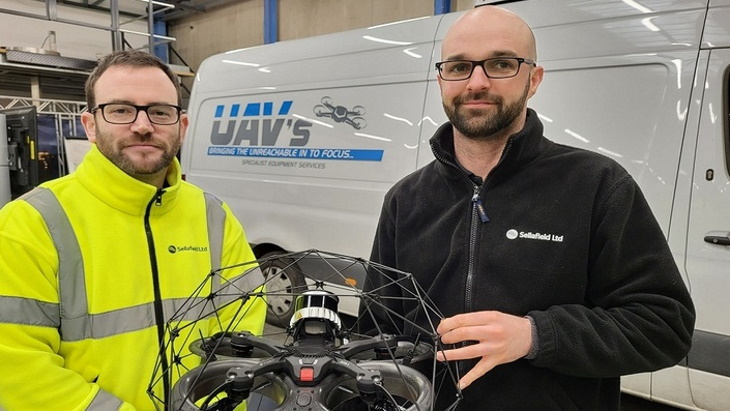
Sellafield Ltd said the deployment of the Elios 3 drone - supplied by Swiss drone developer Flyability - equipped with a Light Detection and Ranging (LiDAR) sensor "marked a major milestone for the Unmanned Aerial Vehicle (UAV) team", enabling the company to achieve "unparalleled efficiency" in mapping and 3D modelling.
"We're thrilled that this first flight of Elios 3 with the LiDAR payload was a success and the data collected is now being processed in a Computer Aided Design system which will produce a 3D model of the area in question, helping to inform engineering decisions going forwards," said Amanda Smith, UAV equipment programme lead at Sellafield Ltd.
"Sending a drone into this tight and unused space rather than an employee in the first instance reduces risk, and also saves time and money," she added. "The team put a lot of work into making sure they were fully prepared for this flight. There are building plans they can study and try to work out the best route for the drone to take."
Sam Jay, UAV equipment engineer and chief pilot at Sellafield Ltd noted: "The flights can be very intense and in this case there was pipework everywhere. The drones fly in a cage with sensors so if they do happen to touch anything they won't be damaged. The hardest part is remembering your way out again. In such a short space of time you need to get in and out quickly. There can be a lot of pressure as not getting the drone out and having to send someone in after it would defeat the point of the flight.
"Now that we have scanned the area the engineers can design scaffolding before they go to unblock a pipe which has been causing an issue in this particular area. By deploying the drone, and speeding up the process we have potentially saved the company, and the taxpayer, hundreds of thousands of pounds."
Shortly after this first flight, the team then flew the Elios 3 drone with a RAD (radiation activity detection) dosimeter, which they hope will allow them to map radiation hotspots in areas before other colleagues enter unused areas of the Sellafield site.
"The deployment of the drone with a radiation payload demonstrates the organisation's commitment to exploring innovative solutions for radiation assessment, reducing risk to those working on the Sellafield site," Sellafield Ltd said.
Sellafield Ltd is the organisation responsible for the safe operation and clean-up of the Sellafield site in Cumbria, UK, as a wholly-owned subsidiary of the Nuclear Decommissioning Authority. The site - which houses more than 1000 buildings - is the largest nuclear complex in Western Europe. Sellafield's nuclear facilities include those connected with the Magnox reprocessing programme, the Sellafield mixed-oxide fuel plant, the Thermal Oxide Reprocessing Plant, and nuclear waste treatment plants. It is also home to redundant facilities from defence work in the 1950s, which included making plutonium for nuclear weapons.